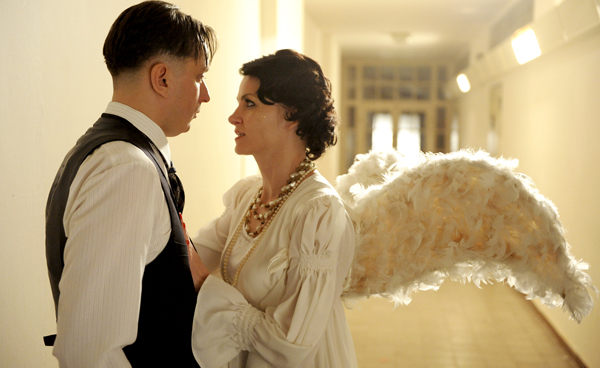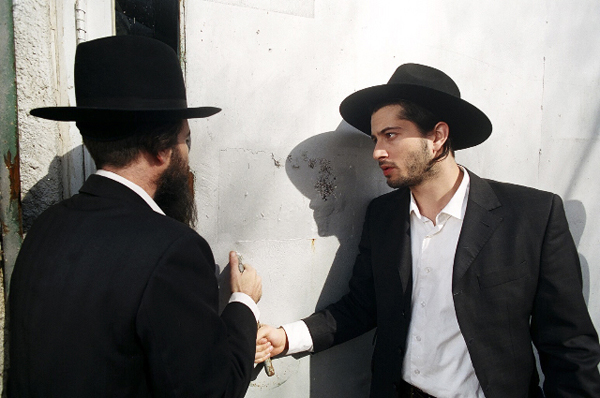|
Reviews of Recent Independent, Foreign, & Documentary Films in Theaters and DVD/Home Video

The 19th Annual New York Jewish Film Festival True stories, whether fictionalized or in documentaries, stand out among the 32 features and shorts from 13 countries in this year’s edition, presented by the Jewish Museum and the Film Society of Lincoln Center. Here are the most highly recommended: Inspired by the experiences of Italian journalist Curzio Malaparte in Nazi-occupied Romania, Gruber’s Journey quietly but devastatingly imagines the writer struggling to fulfill a special assignment for Il Duce on the Eastern front. His allergies are giving him a very bad day in July 1941, and a Bucharest doctor suggests he consult the allergist Dr. Josef Gruber in Jassy. The combined efforts of the friendly, elaborately uniformed Italian consul, the German commandant, and the Romanian police chief, who assiduously follows the Gestapo’s orders, can’t seem to locate Dr. Gruber. Malaparte uses up his petrol allotment, driving by smashed stores scarred with anti-Jewish graffiti. Cries are heard in the distance as he drives out to the train station, where he keeps searching for help with his sniffles. Even when he stands amidst a jaw-dropping scene of the absurd, no bureaucrat is let off easy as a buffoon. Malaparte went on to write Kaputt in 1944, one of the first literary exposés of the genocide of Romanian Jews. Director Radu Gabrea was born before World War II, so he wouldn’t be considered part of the Romanian New Wave of such cynical films as The Death of Mr. Lazarescu and Police, Adjective, but he effectively demonstrates a similar deadpan affinity for brilliantly eviscerating bureaucracy. The pogrom and massacre at Jassy are among the well-organized events of mass murder thoroughly detailed by director Michaël Prazan’s Einsatzgruppen: The Death Brigades. It is made abundantly clear that whether in Romania, the Baltic countries, Ukraine, or other republics of the Soviet Union, police, militia, and other nationalistic local forces first set off the violent pogroms, then efficiently carried out the instructions of Nazi supervisors for a systematic elimination of their entire Jewish populations. Formal reports to Berlin, astounding archival film and photographs support very specific and descriptive interviews with local witnesses, the few scattered survivors, and a German veteran seen with a hidden camera. “Part I: The Mass Graves (1941-1942)” doesn’t just forcefully show how identical procedures were followed for the round-ups, but it also examines the 3,000 Germans in this supervisory corps of highly educated officers. They seem very much like the nasty children grown-up from The White Ribbon. One was so proud of having multiple degrees that he insisted on being called “Dr. Dr.” even at his Nuremburg trial (most were never charged). “Part II: The Funeral Pyres (1942-1945)” could also be called “The Cover Up,” as these smart commanders foresaw that the Thousand Year Reich would reign shorter. They revisited every burial site, this time with disposable slave labor, and thoroughly destroyed the evidence. In Germany, only a handful of Jewish families were hidden from the Nazis, like the parents of director Ludi Boeken. Saviors in the Night is his moving tribute to the few rescuers in this dramatization of Marga Spiegel’s memoir about the Westphalian farmers who hid her family. With a son volunteering at the front and a daughter active with the Nazi youth group, the Aschoff family are loyally nationalistic and believe in the propaganda against Jews. But they have known a particular Jewish horse trader, Menne, for years as an honest and trustworthy war veteran, and so they reluctantly agree to take in his towheaded wife and daughter to pass as Aryan guests from another city. Others at a nearby farm take pity to impulsively stash Menne in a barn. But none anticipate how these sudden decisions will wrack them with stress and tension as the war drags on. That all these farmers are honored as saviors at the Yad Vashem memorial in Israel testifies to the exceptionality of their everyday courage. Menemsha Films will release this later in the year. Protector, the Czech Republic’s submission for the Foreign Language Academy Award, deftly weaves fact into a fictional story with lively acting and striking images. A radio announcer (Marek Daniel) reluctantly rises to be the voice of the Nazis’ “protectorate” over Czechoslovakia, and gets sucked into its hypocrisy, ostensibly to protect his beautiful, restless Jewish actress wife, whose rising movie career has been cut short. Twenty years ago director Michael Verhoeven satirized a German town’s stonewalling a student’s research into its Nazi past in The Nasty Girl, and more recently his documentary The Unknown Soldier controversially looked at crimes committed by ordinary soldiers. In the documentary Human Failure, he looks at how all Germans benefited, whether directly or indirectly, from the removal of Jews. In the fatherland, expropriations of property and possessions were carried out in plain sight by the tax department, as were the public auctions. Long forms were filed listing all transactions, down to the last bowl and blanket (including papers signed at Dachau in order to meet the letter of the law). Though Verhoeven gets confusingly distracted by the unending pathos of what happened to so many victims and the tracking down of survivors and descendants, the story of the determined efforts of historians and archivists to obtain these files and begin this fresh analysis of everyday life under the Reich is informative enough. Menemsha Films will distribute. Nonagenarian Ruth Gruber has a lot to talk about in Ahead of Time. As a scholar, photojournalist, and government envoy, she traces her amazing journey before World War II from Brooklyn to Hitler’s Germany. During the war, she chaperoned the only Jewish refugees the U.S. allowed in (her mother even lend a bridal veil to one). From displaced persons camps, she went on board the ship Exodus as it tried to break the British blockade against Holocaust survivors entering Palestine, taking photographs for Life magazine that moved hearts all over the world. Director Bob Richman reunites her with people from her past, or their children, and she patiently answers the questions of young relatives and admirers as the very model of a modern role model.
In the sensitive Valentina’s Mother, Pola and Valentina are both Polish immigrants to Israel, and their shared language becomes both a cultural bond and a path to misunderstanding. The stubborn Pola (Ethel Kovenska) came shorn of family six decades ago. Pretty young blonde Valentina (Sylvia Drori) has various explanations for why she just arrived in Israel and is willing to work for Pola. Writing/directing partners Matti Harari and Arik Lubetzky’s beautifully acted adaptation of Savyon Liebrecht’s novella Women From a Catalog (not yet out in English) aches with tremendous sympathy for both generations. Of all the diverse communities in Israel, the Ultra-Orthodox, also called the Haredi, may be the most difficult to capture on film as individuals because of their uniform appearance and shunning of popular culture, though they wield key political power in the country. Gevald! is a rare opportunity to hear from two of their leaders during the 2006 election campaign. Though to most Americans they look similar with their beards and suits, this less than hour-long documentary helpfully parses their differences. Avraham Ravitz worked within the system as a member of parliament, garnering his community substantial benefits. Shmuel Chaim Pappenheim is an anti-Zionist agitator, who not only scorns Ravitz as a sell-out to the secular state but as an impediment to the coming of the Messiah, as is anyone who votes or takes any government money. (His community lives on donations from Hasidic Satmars in the United States.) He may have regretted allowing directors Ron Ofer and Yohai Hakak interviews as he was consequently fired as an editor for an excess of pride. Haim
Tabakman’s debut feature, Eyes Wide Open, may inevitably
be labeled a Hasidic Brokeback Mountain. Wistful yeshiva student
Ezri seems like a lost soul as his pleading phone calls to another man
go unanswered when he wanders through a religious neighborhood in
Jerusalem one night. (Any Israeli teenage girl would immediately
recognize Ran Danker as a top TV pop star and eligible bachelor.) Aaron
(Zohar
Shtrauss) lets the younger man stay in his butcher shop for
the night before he goes home to his wife and many children. As Ezri
stays on and settles in, the men's emotional and physical relationship
gradually grows. Aaron tries to find some kind of balance between his
internal awakening and the external pressures from a community that sees
homosexuality as incomprehensible or reprehensible. The poignant film
accents the homoerotic resonance in a strictly sex segregated society,
and is is equally sensitive to Aaron’s wife
and the ritual aspects of lives they don’t want to abandon—running away
to join a Gay Pride parade in Tel Aviv is not a solution. New American
Vision will release the film next month.
Nora Lee Mandel
|


